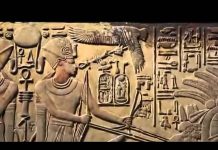In the tumultuous landscape of the early 1970s, a single-minded revolutionary found sanctuary amidst the dense jungles of Cambodia. As the thunderous cacophony of American bombs echoed around him, he clung to his clandestine mission to reshape his own culture in the pursuit of a utopian ideal. What transpired was a nightmarish odyssey marked by unparalleled chaos, a period in which nearly two million lives, equating to almost one in every four Cambodians, would be tragically extinguished. This is the haunting narrative of how Pol Pot ascended to power and the unspeakable horrors that defined his regime—a story vividly depicted in the compelling documentary, “Pol Pot: Unveiling the Dark Legacy.”
Pol Pot’s journey from an unassuming birth as Saloth Sar in 1925 to the monstrous figure at the helm of Cambodia’s darkest era is a chilling tale that defies comprehension. Raised in a relatively privileged environment, his early life offered no foreshadowing of the horrors that would soon unfold. His sojourn to France for higher education exposed him to radical political ideologies, planting the seeds that would ultimately germinate into a devastating reality.
Upon his return to Cambodia, Pol Pot aligned himself with kindred spirits to form the Communist Party of Kampuchea, more commonly known as the Khmer Rouge. Their ambition was nothing short of revolutionary—an audacious quest to establish an agrarian utopia that would soon spiral into a dystopian nightmare. Pol Pot’s ascent to power was marked by cunning and ruthlessness, exploiting the turmoil of the Vietnam War and Cambodia’s internal strife to seize control.
Under Pol Pot’s iron-fisted rule, Cambodia descended into an abyss of unparalleled horror. The regime orchestrated a brutal campaign to forcibly transform the nation into an agrarian utopia. Cities were emptied as urban populations were ruthlessly uprooted and transplanted to grueling rural labor camps. Intellectuals, professionals, and anyone deemed a threat to the regime faced systematic persecution and execution.
“Pol Pot: Unveiling the Dark Legacy” delivers a potent and unvarnished account of life under the Khmer Rouge’s reign of terror. The documentary weaves together survivor testimonies, archival footage, and interviews with witnesses, offering an unflinching glimpse into the depths of human suffering. It confronts the horrifying details of the atrocities perpetrated by Pol Pot’s forces, delivering a searing exploration of one of history’s most sinister episodes.
The documentary refuses to shy away from the grim realities that defined life under Pol Pot’s regime. It fearlessly uncovers the immense human toll exacted by an ideology of radical egalitarianism, exposing the horrors of mass starvation, forced labor, and widespread misery. Through vivid storytelling, the film lays bare the devastating consequences of ideological extremism.
One of the documentary’s most commendable achievements is its ability to contextualize Pol Pot’s reign within the broader historical and geopolitical landscape. It probes the involvement of global powers, including the United States, in fostering instability in Southeast Asia during the Vietnam War. By shedding light on these external factors, the documentary illuminates how they contributed to Cambodia’s tragic descent into chaos.
In conclusion, “Pol Pot: Unveiling the Dark Legacy” is a riveting and meticulously crafted documentary that unravels one of the most harrowing chapters in human history. It offers a comprehensive and unflinching examination of Pol Pot’s rise to power, the brutality of his regime, and the unimaginable suffering it inflicted upon the Cambodian people. Through its powerful storytelling and the harrowing accounts of survivors, the documentary stands as a poignant reminder of the perils of ideological extremism and the profound impact it can have on a society.

































